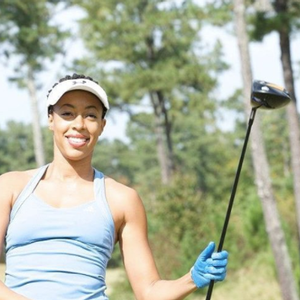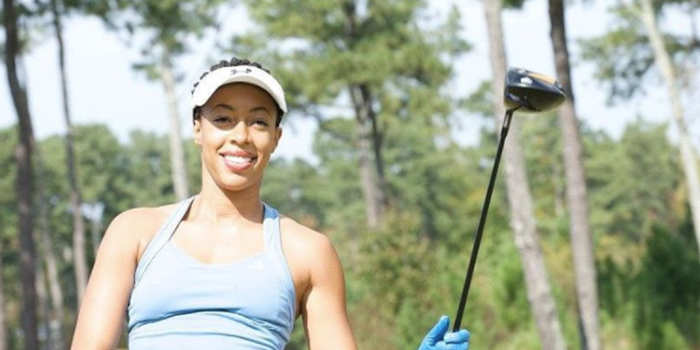'I'm A Woman Of Color In The Professional Golf World--Here's What It's Like'
![]()
April 2, 2018
"I've experienced plenty of atmospheres of exclusion and disdain at some golf courses and tournaments."
*Watch Andia Winslow here.
Andia Winslow is nothing if not a groundbreaker: She was the first African-American woman to play varsity golf at an Ivy League university, and the fourth African American to ever compete in the Ladies Professional Golf Association Tour (LPGA) competition.
Today, she's a top sports performance coach and trainer in New York City and Los Angeles. She took time from her busy schedule to open up about being a black woman in the professional golf world, and how she got where she is today.
ON DISCOVERING A LOVE FOR GOLF...
"I played several sports when I was young, but from the time I was 10 years old, golf was my number one. I grew up in Seattle, Washington and got my start at Jefferson Park Golf Course, affectionately known as the 'home' of Fred Couples, PGA great. Picture towering trees, wildlife, ever-present mist, and green—green everywhere! Something about the game and its inherent quietude, I knew, even as a kid and just learning, that golf was an eternal challenge that couldn’t be conquered. That intrigued me then, and it still does now.
"Though my parents enrolled me in various summer camps and activities, a friend alerted them to a free junior golf program with the Fir State Golf Club. Established in 1947, the club’s mission was to provide learning and competitive opportunities for golfers of color amidst the racially discriminatory policies of the Seattle Parks Department and area private country clubs. Though times had changed since then, the member-based club endured and became a Jefferson Park Golf Course fixture.
"My first golf coach, and co-founder of Fir State, was an elder gentleman named Wilbert Ponder. I would follow him around the golf course everyday like a duckling, watching his swing and replicating his grace and power."
ON THE PLAYERS WHO PAVED THE WAY...
"Golf has historically been an exclusionary game and the sacrifices of black golf pioneers were not lost on me. Until 1961, the PGA had a 'Whites Only' clause—reflecting the attitudes and policies of the country at the time—which relegated folks of color to service and caddy roles. Being ever resourceful and determined, those golfers created their own competitive tours and member-based affinity organizations.
"Charlie Sifford and Althea Gibson (yes, the tennis great!) were the first male and female professional golfers to desegregate and compete on 'the big stage,' the PGA (1954) and LPGA (1963) tours, respectively.
"Mr. Sifford took me under his wing and became a grandfather figure when I was 11 years old. While a junior golfer, I was most often the only or one of the very few African-American athletes competing in elite level tournaments. He explained to me that, 'the importance of being the first is to make certain that you’re not the last.' I was proud to be in attendance when he was inducted into the World Golf Hall of Fame in 2004 and 10 years later when he received the Presidential Medal of Freedom in 2014."
ON BECOMING A FIRST...
"In the year 2000, I became the first African-American woman to play varsity golf in Ivy League history, at Yale University. In 2006, I became only the fourth African American woman to ever play in an LPGA (Ladies Professional Golf Association) Tour event.
"To stand on the first tee and hear my name announced at the start of play and to walk 'inside of the ropes' with my family in attendance was a remarkable experience for me."
ON OVERCOMING OBSTACLES...
"But the journey was not a crystal stair and there are distinct moments of transition in my career that proved memorable.
"I experienced plenty of atmospheres of exclusion and disdain at some golf courses and tournaments, dealt with nagging injuries (broken fingers), and faced extremely poor collegiate coaching support. When I went professional, after competing as an amateur, I struggled to secure sponsorship in a down market. It was during these moments that I learned the importance of resourcefulness and aligning oneself with a positive support team. The human element helped me prevail and I am forever thankful for those who have stood and continue to stand in support of my varied efforts."
ON MAKING THE GAME MORE DIVERSE...
"Though there are remnants of exclusionary attitudes in the game on the basis of race, gender, and socioeconomic status, thankfully, lovers of the game persist in their efforts for access and equity. Men-only golf clubs have been called out publicly to end their exclusionary practices, as seen in the case of the Augusta National Golf Club [which banned female members until 2012]. Better effort has been taken to involve youth and often disenfranchised communities in learning the game and the diverse educational and professional opportunities therein."
ON HELPING CREATE CHANGE...
"I take my responsibility as an ambassador of the game seriously and work every day to grow the game in diverse communities. Organizations with which I’ve been proud to partner include the Bill Dickey Scholarship Association, which has provided over $3.6 million in college scholarships to golfers of color, The First Tee, which introduces golf and it’s life lessons to youth, and the Executive Women’s Golf Association, which introduces business women to the game for professional development and networking opportunities.
"In addition to playing, I love to teach. I’m thankful for The Golf Club at Chelsea Piers for being my teaching home base during my years in NYC. It was there that I met a cross-section of the community that makes New York the best city in the world.
"Golf is a game for everyone. Golf is the game of a lifetime."
ON SUPPORTING ASPIRING ATHLETES...
"My advice to any women looking to pursue a professional career in golf, or really anything in the fitness industry, is discover that which intrigues and challenges you. What do you love to do? What drives you? From there, research your craft and seek out programs and mentors who can assist in your professional development.
"For those wanting to compete professionally, the biggest barrier is capital. Can you raise the funds necessary to train and compete full time? I’m currently consulting with a few organizations that are working to find ways to sustain athletes who have demonstrated talent and commitment.
"It’s not easy, but the journey is worth it."

